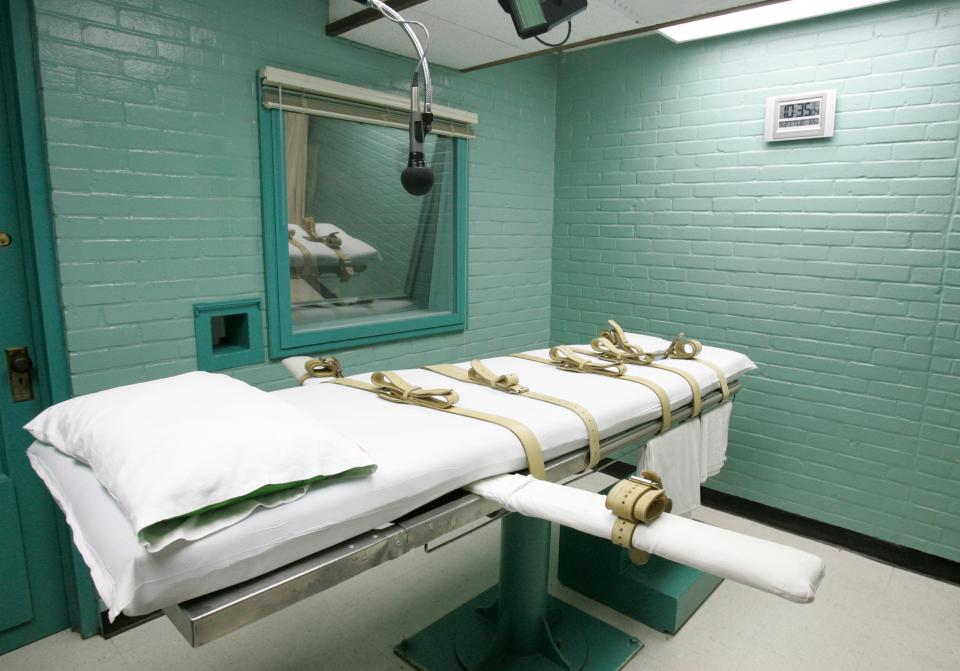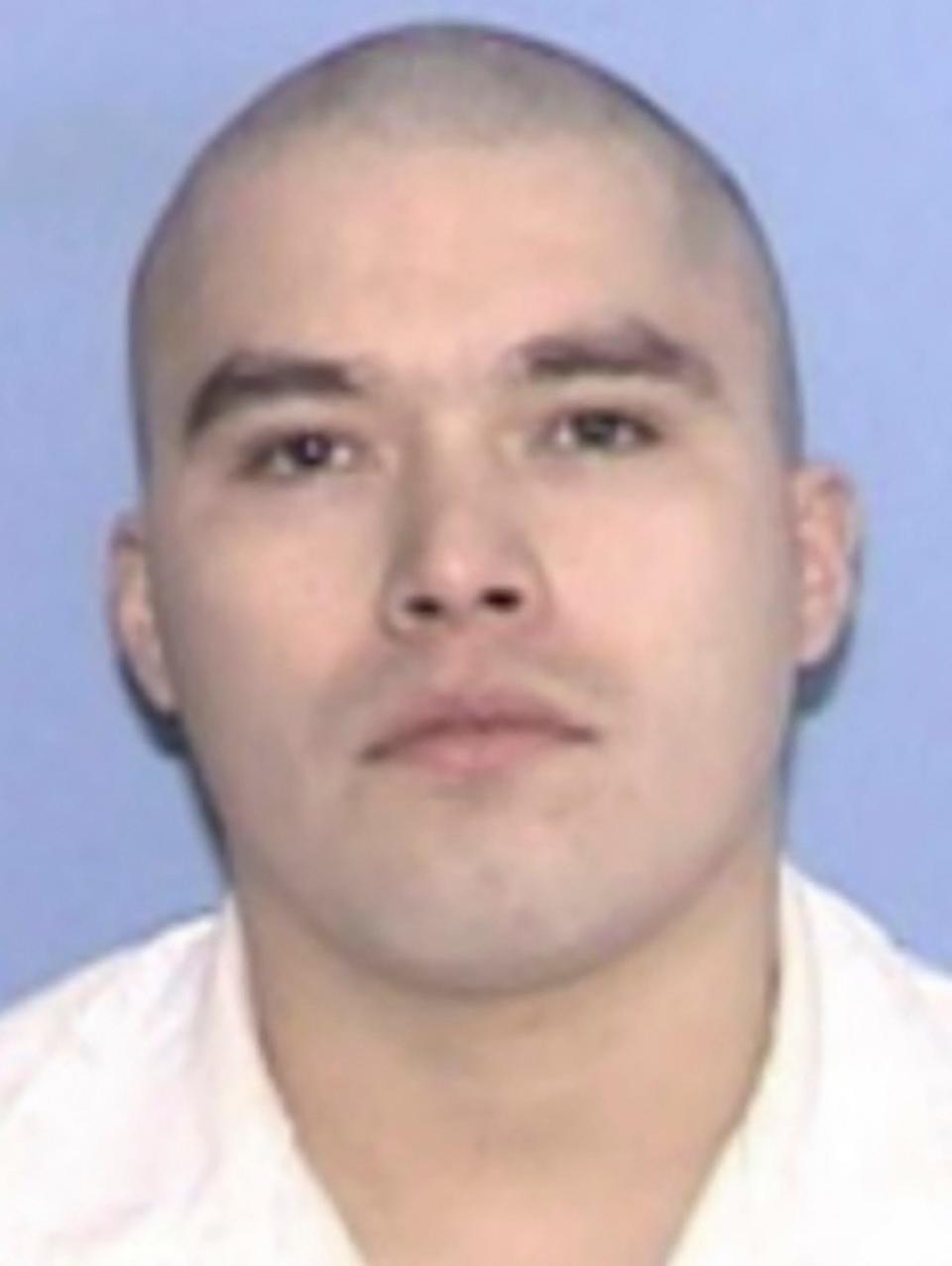Texas death row case: Supreme Court grapples with prayer, touch in execution chamber

For Pastor Dana Moore, the request is straightforward. He wants to hold hands and pray with a member of his congregation.
But Moore’s otherwise simple desire is caught up in an epic legal struggle at the Supreme Court because of where and with whom he wants to do his work: A Texas execution chamber where the state intends to put convicted murderer John Ramirez to death.
"I just want to be able to touch John," said Moore, who for years has made the four-hour drive once a month from his Second Baptist Church in Corpus Christi, Texas, to minister to Ramirez in prison. "If I'm standing right by him, why can't I just reach out?"
Ramirez’s case, which will be argued at the Supreme Court on Nov. 1, comes as the justices have been expanding religious protections for all Americans, including death row inmates. It raises fundamental questions about what spiritual allowances states must make for those facing a death sentence.
On hold: Supreme Court halts execution of Texas inmate seeking pastor's touch
Out of the shadows: Texas abortion ruling renews criticism of Supreme Court's 'shadow docket'
When a spiritual adviser is present at an execution, what may they do? Should they be permitted to pray out loud? Can they put a hand on an inmate’s shoulder? At what point might a religious request interfere with the state’s ability to carry out a death sentence?
Federal courts have intervened three times to halt Ramirez’s execution, including earlier this month when the Supreme Court took the unusual step of moving his appeal from its emergency docket – where cases are decided quickly and without oral argument – to the more methodical process it uses to consider major controversies on their merits.
Experts predict that is because at least some of the justices have something to say about the intersection of religion and capital punishment.
"The court views this issue as important and wants to get it right," said Eric Rassbach, senior counsel at Becket, a prominent advocacy group for religious rights. "We view it as a good thing that the court is giving its full attention to this ancient religious practice."
Touch and prayer
Moore has been meeting with Ramirez since 2017, one of four inmates he visits regularly at the Allan B. Polunsky Unit in Livingston, Texas. When Ramirez asked to join Moore’s church, the Southern Baptist pastor agreed, making an exception to a general rule that members of the congregation attend services.
Throughout the years, as the two have prayed together, they have pressed their palms to the plexiglass that divides them. Moore and Ramirez have never touched.
And that’s unusual, Moore said. When he prays with a member of his flock, either at church or at bedside in a hospital, he usually holds that person’s hand. If that’s not possible, he might lay his hand on a parishioner’s shoulder. There have been times, Moore said, when his only option has been to hold a person’s foot.
It’s the physical connection to someone who cares that matters, Moore said, not the particulars.
"There's something incredible about it. It's powerful," he said. "I'd love to be holding my wife's hand when I die."
Experts say the religious significance of touch partly stems from the growth of Pentecostalism in the United States in the early 20th century – a more experiential form of religion that has influenced how many Christians think about their faith.
"It’s a coherent thing to me to think that his experience of Christianity – even if it's not enshrined in a kind of creed somewhere – is dominantly shaped by this paradigm of laying on of hands, of spiritual comfort, of spiritual power that can pass between two people," said Kathryn Reklis, a theology professor at Fordham University.
Security and risks
Ramirez's execution has been held up twice before, including in 2017 over a question of whether his attorney failed to file a clemency request, and again in 2020 when his attorneys raised concerns about the state's COVID-19 outbreak.

Moore dismissed the notion that Ramirez was making his latest claim as a delay tactic, noting the two had assumed they would be able to touch and pray once Texas allowed a spiritual adviser into the death chamber.
But Texas told the Supreme Court it has an interest in limiting that interaction to ensure the execution goes smoothly. State officials also question in court documents how far an inmate may go in making demands to facilitate their religious exercise.
"That a state may not impose policies coercing an inmate to do what his religious (tenets) forbid does not mean that it must accede to his every religious demand," Texas attorneys told the nation's highest court. "As in incarceration, restrictions are inherent in execution."
Ramirez, 37, fatally stabbed Pablo Castro, a convenience store clerk, in 2004. He and two women were looking for drug money when they confronted Castro outside the store. According to the Texas Department of Criminal Justice, Ramirez beat and kicked Castro and stabbed him 29 times. The three left with $1.25.
Ramirez was arrested four years later at the Texas-Mexico border.
"Honestly, if he wants a priest to bless him before he's sent off, by all means, go ahead," Aaron Castro, the victim's son, told KRIS News in Corpus Christi this month. "That doesn't affect me one bit. What affects me is why this process continues to get delayed time and time again."
Moment of death

At a time when conservatives on the Supreme Court have sought to shield religious freedom from interference in other contexts, such as when those protections conflict with LGBTQ rights, the justices have also been expanding the rights of death row inmates to worship.
In 2019, the court was criticized for refusing to block the execution of a Muslim man in Alabama who was denied an imam – even though the state permitted Christian chaplains to attend executions. A majority of the court said that Domineque Ray had made his appeal too late. Ray, convicted of killing a 15-year-old girl in 1995, was executed hours after the Supreme Court’s order.
A month later, a 7-2 majority halted the execution of a Texas prisoner who initially wasn’t permitted to have a Buddhist spiritual adviser at his side during his execution. Associate Justice Brett Kavanaugh wrote that once a state permits a religious adviser of one denomination, such as a Christian preacher, it can’t exclude rabbis, imams and other advisers.
Texas: Supreme Court blocks execution of Texas prisoner denied Buddhist adviser
The result was that Texas and Alabama barred all spiritual advisers from the execution chamber. But earlier this year, another appeal to the Supreme Court changed the calculus once again. In that case, an Alabama man on death row, Willie Smith, sued to have a pastor at his execution and a majority that included Associate Justice Amy Coney Barrett and the court's liberals ruled in his favor.
Prison security, Associate Justice Elena Kagan wrote in that case, is a legitimate state interest. But Alabama failed to show a spiritual adviser affected officials' ability to safely execute an inmate.
"The law," Kagan wrote, "guarantees Smith the right to practice his faith free from unnecessary interference, including at the moment the state puts him to death."
The claims have been brought under a federal law, the Religious Land Use and Institutionalized Persons Act, approved unanimously by Congress and signed by President Bill Clinton in 2000. Among other provisions, the law allows a warden to burden an inmate's religious exercise only if there is a compelling reason to do so and only if officials use the least restrictive method available to achieve that interest.
Texas may face a challenge in convincing the high court that audible prayer and touch cannot be accommodated, experts said, given that Alabama recently announced it would permit both as officials there administer a lethal injection to Smith. Smith, who was convicted in the 1991 kidnapping and murder of a 22-year-old woman, is now scheduled for execution on Oct. 21.
Because the question of spiritual adviser conduct is so new, experts say other states have not yet grappled with it. The Federal Bureau of Prisons, which oversees federal executions, allows one spiritual adviser in the execution chamber but a spokesperson for the agency declined to say if there is a policy dictating what they can do.
Attorney General Merrick Garland ordered a moratorium on federal executions in July.
"There is no protocol that I'm aware of at either the state level or the federal level that specifies what conduct a religious adviser is permitted to engage in," said Robert Dunham, executive director of the Death Penalty Information Center.
"Texas having someone in there and the rule being you've got to shut up, clearly, is on the wrong side of the line," Dunham said. "The question that's not as clear is, at what point 'hands on' crosses that line."
Contributing: Corpus Christi Caller-Times
This article originally appeared on USA TODAY: Supreme Court weighs if pastor may touch inmate, pray during execution

 money
money 